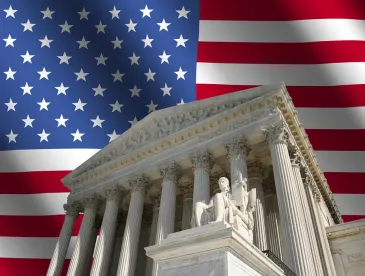In a decision that may have significant impact on businesses that face Telephone Consumer Protect Act (“TCPA”) related class action litigation, the Supreme Court recently accepted certiorari of a petition to rule on the constitutionality of the TCPA. The Court agreed to review a ruling of the Fourth Circuit which held that a TCPA exemption for government debt collectors was in violation of the First Amendment.
Specifically, the Supreme Court will address the issue of whether the government-debt exception to the TCPA’s automated-call restriction violates the First Amendment, and whether the proper remedy for any constitutional violation is to sever the exception from the remainder of the statute. The Fourth Circuit concluded that the government-debt exception was unconstitutional, and to sever the government-debt exception but leave untouched the TCPA’s general restriction on calls made with an “automatic telephone dialing system” (“ATDS”). It is still unclear whether the Supreme Court will only address severing the government-debt exception, or the constitutionality of the TCPA in its entirety.
This is not the first time, of late, that the Supreme Court has been petitioned to address the constitutionality of the TCPA. Back in October of 2019, the Court was petitioned to review the following issues: 1) whether the TCPA’s prohibition on calls made by ATDS is an unconstitutional restriction of speech, and if so whether the proper remedy is to broaden the prohibition to abridge more speech, and 2) whether the definition of “ATDS” in the TCPA encompasses any device that can “store” and “automatically dial” telephone numbers, even if the device does not “us[e] a random or sequential number generator.” The Court has still not announced whether it will accept this petition.
When the TCPA was enacted in 1991, most American consumers were using landline phones, and Congress could not begin to contemplate the evolution of the mobile phone. The TCPA defines ATDS as “equipment which has the capacity—(A) to store or produce telephone numbers to be called, using a random or sequential number generator; and (B) to dial such numbers.” 47 U.S.C § 227(a)(1). In 2015, the Federal Communications Commission (FCC) issued its 2015 Declaratory Ruling & Order (2015 Order), concerning clarifications on the TCPA for the mobile era, including the definition of “Automatic Telephone Dialing System” (ATDS) and what devices qualify. The 2015 Order only complicated matters further, providing an expansive interpretation for what constitutes an ATDS, and sparking a surge of TCPA lawsuits in recent years.
In 2018, the U.S. Court of Appeals for the District of Columbia set aside the FCC’s expansive interpretation of what constitutes an ATDS and its approach to consent of reassigned wireless numbers. Since that decision, a circuit split has developed with the Third Circuit ruling that a dialer is not an ATDS unless it has the present ability to randomly or sequentially generate numbers and to dial them and the Ninth Circuit adopting a broader reading holding that the definition of ATDS includes any equipment that has the capacity to store random numbers and dial them, even if it cannot generate numbers randomly or sequentially. In February of 2019, a petition of writ of certiorari was filed with Supreme Court, to review the Ninth Circuit panel’s decision, but shortly after the parties reached a settlement agreement. Given the circuit split over the definition of ATDS under the TCPA, the issue is ripe for the Supreme Court to address.
There has been great uncertainty surrounding TCPA litigation in recent years, and 2020 may be the year organizations facing such litigation finally get some clarity on key issues. In the meantime organizations are advised to implement and update their telemarketing and/or automatic dialing practices to ensure TCPA compliance.




 />i
/>i
